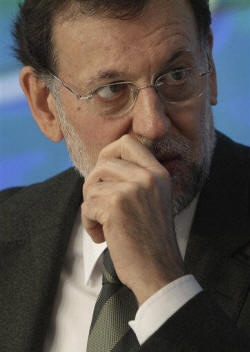 |
|

Spain's bond yields jump as bailout fears grow
[April 16, 2012]
MADRID (AP)
--
|
Monday's yield is the highest since the country's new conservative government under Prime Minister Mariano Rajoy took office in December. The 10-year bond yield surged toward 7 percent late last year, a rate considered unsustainable for a country over a long period. Greece, Portugal and Ireland had to ask for bailouts after their yields stayed above 7 percent. Although the administration has implemented a barrage of labor and financial reforms, investors remain worried about Spain on several fronts: - the country's banks are weighed down by a mountain of bad loans from the collapse of the property market in 2008. - many of the Spain's 17 semiautonomous regional governments have overspent wildly. - Spain is expected to enter its second recession in three years this quarter, with the country's central bank forecasting its economy will contract 1.7 percent this year. The unemployment rate is 23 percent, rising up to almost 50 percent for those aged under 30. The jump in Spain's yield comes at the beginning of a week in which the country's Treasury holds two rounds of bond auctions -- 12- and 18-month bills on Tuesday, and benchmark 10-year bonds on Thursday. The government insists it will have no trouble financing itself this year and that auctions held so far this year have gone well. But that changed almost two weeks ago, when a medium-term debt auction hit the bottom end of what the Treasury targeted, triggering the latest increase in yields and placing Spain firmly back into the center of the eurozone debt crisis. The situation was not helped by government-released data Friday showing the country's troubled banks borrowed a record (EURO)316.3 billion ($415.9 billion) from the European Central Bank in March, demonstrating the difficulty they have securing financing elsewhere. Monday's bond market jitters extended to Italy, viewed as another weak link in the 17-nation eurozone. Its 10-year bond yield rose to 5.60 percent from about 5.50 percent on Friday. Spain's Ibex 35 trading index was slightly negative after taking a punishing 3.6 percent drop Friday. After the bailing out Greece, Portugal and Ireland, the eurozone has agreed to increase the size of its financial firewall to help out its members should they fail to raise money from the markets. But Spain's (EURO)1.1 trillion ($1.45 trillion) economy is twice the size of the previous three bailout victims put together. Analysts say the eurozone's (EURO)800 billion firewall is not large enough to deal with the potential threats coming from Spain and Italy. Economy Minister Luis de Guindos traveled to Paris on Monday to meet investors to try to convince them Spain was on the right track. He will meet ECB President Mario Draghi on Tuesday. Spain's plight is also likely to addressed at the meeting next weekend in Washington of the International Monetary Fund and World Bank. |



